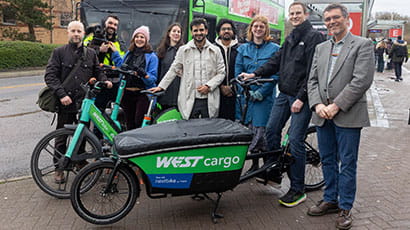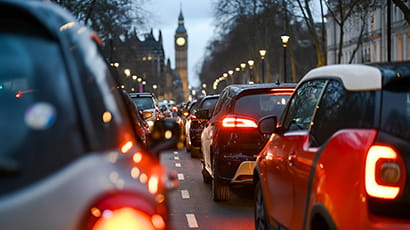UK industry set to miss 2050 net zero without urgent action

The majority of UK industry sectors will miss 2050 Net Zero targets unless there are significant further steps taken by the Government, including acceleration of consumer education and behaviour change. This is according to the Journey to Net Zero report, undertaken by the University of the West of England (UWE Bristol) and commissioned by insurer Zurich UK.
The study examined the 17 key UK industry sectors, outlining the scale of their Net Zero challenge and the steps that could help them play catch-up on carbon emissions.
Most of the 17 industry sectors are currently off track to hit 2050 emissions targets, given they are expected to miss 2035 emission reduction targets by 197 megatons (131mt reduction, of a required 328mt). The report identified manufacturing, construction and transport as needing particular attention, given the steep carbon challenges they face. It found that only five of the 17 industries analysed are currently decreasing emissions, five are stable and seven are actually increasing their levels of emissions year-on-year.
The study also highlighted the interconnection between industry sectors, as well as the need for the Government to act as the coordinating voice in order to implement progressive initiatives.
Dr Laura de Vito, who works in UWE Bristol’s Air Quality Management Resource Centre and is lead report author, said:
”The UK industrial sectors are highly interconnected and therefore it is important to adopt a joined-up and collaborative approach to Net Zero.
“The UK government will need to play a crucial role in driving this change at the required scale and pace, and in unlocking collaboration opportunities across industry sectors and at all levels of society.”
According to the research, a joined-up approach is particularly relevant for some heavy industries within manufacturing. For example, carbon-intense cement production impacts the construction sector directly. This means that many industries’ challenges cannot be overcome without the adoption of a ‘whole of supply chain’ perspective, according to the report.
Some tasks are also too great for any one industry and require a nationwide approach, including the education of consumers and enabling behaviour change to make greener options more desirable.
The report strongly recommended focusing on enabling a shift in public attitudes in addition to finding technological solutions, and highlighted the arts and entertainment sector as having a key role to play in influencing public opinion, encouraging responsible consumption and understanding what is at stake for the earth.
The report underlined that although the cost of decarbonisation will reach 1-2% of GDP in 2050, it is ultimately affordable - and the cost of inaction will be far greater.
Shaun Hicks, Chief Risk Officer at Zurich UK said:
“The Government needs to publish a detailed roadmap to a net-zero economy, with sector-by-sector analysis and a timeline of decarbonisation expectations to contribute to the overall 2050 national target. Whilst the application of innovations such as hydrogen fuel and carbon capture have great potential in realising a green future, the government needs to provide further clarity to give businesses the time they need to prepare for the net-zero transition.
“This study underlines that certain sectors are going to find it tough to decarbonise. Yet despite this, it’s also clear that there are sustainable actions, which every business and individual can do now to contribute to the progress we need to achieve net zero by 2050.”
Related news

15 December 2025
UWE Bristol rises eleven places in People & Planet University League
UWE Bristol has risen to 14th in the People & Planet University League (UK), a jump of eleven places.

12 December 2025
UWE Bristol’s environmentally conscious and student-focused accommodation wins three awards
Purdown View, the world's largest certified Passivhaus student accommodation development, has been recognised at Property Week Student Accommodation Awards.

20 November 2025
UWE Bristol ranked among top 12 per cent of universities globally for sustainability
UWE Bristol has climbed over 400 places in the QS World University Sustainability Rankings 2026, which evaluates universities on a range of environmental and social impacts.

06 November 2025
UWE Bristol welcomes West of England Mayor for annual Green Week
Helen Godwin, Mayor of the West of England, visited UWE Bristol during its annual Green Week to see the sustainability-driven research, innovation and skills initiatives that are helping to power the growth of the region’s green economy.

16 October 2025
UWE Bristol signs Repair and Reuse Declaration in commitment to sustainable initiatives
UWE Bristol is the first UK university to sign the Repair and Reuse Declaration as a whole institution, a call to legislators and decision makers to tackle climate change through greater repair and reuse support.

15 October 2025
UK food needs radical transformation on scale not seen since Second World War, new report finds
A new report from the Agri-Food for Net Zero Network+ finds urgent action on food is needed if the UK is to reboot its flagging economy, save the NHS billions, ensure national food security, and meet climate commitments.

24 September 2025
UWE Bristol to help protect threatened forest in Madagascar in £800k project
UWE Bristol is a partner in a groundbreaking project awarded almost £800,000 in funding to protect one of Madagascar’s most precious and threatened forests.

24 February 2025
WESTbusStop+ makes sustainable travel more convenient
A new WESTbusStop+ bringing together buses and other ways to travel has been officially opened at UWE Bristol’s Frenchay campus.

03 January 2025
Big leap forward for environmentally friendly ‘e-textiles’ technology
Research led by UWE Bristol and the University of Southampton has shown wearable electronic textiles (e-textiles) can be both sustainable and biodegradable.

28 November 2024
Work of UWE Bristol academics features in Government report on air quality measurement
Two UWE Bristol academics have made contributions to an influential Government report on the measurement of air pollution.

27 November 2024
Traffic noise reduces the stress-relieving benefits of listening to nature, study finds
Road traffic noise reduces the wellbeing benefits associated with spending time listening to nature, researchers have discovered.

15 November 2024
Grasslands project led by UWE Bristol academic to support UK’s bid for net zero emissions
A UWE Bristol researcher will lead a £4.7 million project focused on the management of UK’s grasslands aimed at supporting efforts to achieve net zero emissions by 2050.






